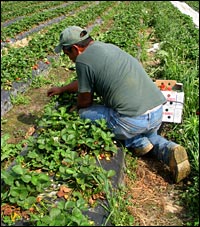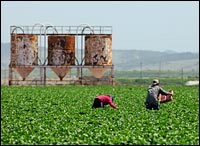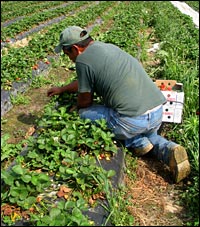When Elena Ortiz found a job on an organic raspberry farm after working for nine years in conventionally farmed fields, she was glad for the change. The best part about her new job was that she no longer had to work just feet away from tractors spraying chemical herbicides and pesticides. An added bonus was the fruit itself — “prettier,” she said, and firmer, which made it easier to pick.

Better living without chemicals?
Photos: iStockphoto
But when it came to how Ortiz was treated by her employers, little was different. Her pay remained meager: $500 a week at peak berry-picking season, but as little as $200 a week during much of the year, leaving her and her farmworker husband with little money to buy fruits and vegetables for their five children. The supervisors at her farm, Reiter Berry, were often “aggressive” and capricious. Rules were arbitrary; workers were sometimes closely monitored, but sometimes allowed to work independently. They were, said Ortiz, assigned to “better or worse rows” — all depending on the whims of the supervisors.
When organizers from the United Farm Workers encouraged the Reiter employees to form a union, the company allegedly responded with intimidation and harassment.
“There was an atmosphere of fear. People were afraid they would be laid off,” Ortiz said in a recent interview. (Elena Ortiz is not her real name; fearful of losing her job, she spoke only on condition of anonymity.) “I wish they would treat us better. What can the people do? Nothing.”
Garland Reiter, one of the co-owners of the company, took objection to Ortiz’s comments. “I think we’re a leader in the industry, living by honesty, openness, and respect,” he said.
Nevertheless, it appears that worker abuse in the organic industry is widespread.
“There’s a common conventional wisdom by a lot of consumers, especially at the higher-end stores, that just because it’s organic the workers are treated better,” said UFW spokesperson Mark Grossman. “And that’s simply not true.”
That disconnect between reality and public perception is of increasing concern to farmworker advocates, food activists, and some farmers, who worry that as the organic sector replicates the abusive conditions of conventional agriculture, it is sacrificing the founding values of the sustainable-food movement. The desire to return organic to its roots is driving a slew of initiatives to develop labor standards for organic farms. If successful, the new standards would establish the organic sector as the kind of fully sustainable industry — both socially responsible and environmentally sound — that could be a model for the entire economy.

Green and red and unfair all
over.
Where Have All the Hippies Gone?
When you go to the supermarket and buy produce or packaged goods that carry the organic label, you can feel confident that the food was grown under rigorous environmental standards. The U.S. Department of Agriculture’s organic seal, which debuted in 2002, is a guarantee that your fruits and vegetables were cultivated without petroleum-based fertilizers or (with rare exceptions) synthetic chemicals, and that they aren’t genetically modified. The organic label, however, goes only so far. While the seal covers a range of environmental practices, it says nothing about labor conditions.
Although comprehensive studies of conditions on organic farms are hard to find, complaints like Ortiz’s are not uncommon. For example, Willamette River Organics, one of Oregon’s largest organic operations, has been hit with several lawsuits charging violations of minimum-wage laws. A Human Rights Watch report on the exploitation of adolescent workers said the atmosphere at Arizona’s organic Pavich Farms was “hostile, suspicious,” with laborers apparently not permitted to speak to inspectors. Threemile Canyon, a large organic dairy and potato farm in Oregon, faces accusations of sexual discrimination in its hiring practices.
Workers get no consolation in the form of higher wages or better benefits, either. According to a report published last year by researchers at UC-Davis, a majority of 188 California organic farms surveyed do not pay a living wage or provide medical or retirement plans. In fact, most organic workers earn the same as those in conventional fields — less (adjusted for inflation) than they were making in the 1970s, when the famous UFW boycotts occurred. “The exploitative conditions that farmworkers face in the U.S. are abysmal — it’s a human-rights crisis,” said Richard Mandelbaum, policy analyst at the Farmworker Support Committee. “In terms of wages and labor rights, there’s really no difference between organic and conventional.”
If that doesn’t seem to fit the organic movement’s hippie and homesteader origins, the incursion of big business may be partly to blame. Reiter Affiliated Companies, where Ortiz works, is a perfect example of how the movement has shifted. With thousands of employees, Reiter is the biggest supplier to Driscoll Berry, one of the country’s largest distributors of strawberries, raspberries, and blueberries. Driscoll sells both conventionally grown and organic berries — an indicator of organic’s growing popularity, but also a sign of how some companies see organic more as a market niche than as a broad business philosophy.
That niche is now a $14 billion industry in the U.S. Giant food-processing corporations, seeing opportunities for expansion, have become major players in the organic industry. For example, General Mills owns the organic brands Cascadian Farm and Muir Glen. Kellogg owns Sunrise Organic. Even agribusiness giant ConAgra is in on the act, recently introducing organic versions of its Orville Redenbacher popcorn and Hunt’s tomato sauce brands.
And while organic’s profitability would suggest that there is plenty of money to pay workers better — for those so inclined — much of the profits go to retailers and wholesalers higher up the food chain. Raising workers’ wages is also complicated by the fact that organic labor costs are disproportionately high, since such operations often depend on hand weeding in place of chemical herbicides.
Ultimately, paying workers more depends on paying farmers more, which appears unlikely in a country that has gotten used to cheap food. “People look down on farmers,” said Tim Vos, one of the co-owners of California’s Blue Heron Farm, which pays its 10 field workers about $12 an hour. “If you want to pay people well, you need high prices. What would it take to offer benefits? We would have to almost double our prices.”

People who feed people.
Plea for the Tillerman
Another obstacle toward improving conditions is that, simply put, the treatment of farm laborers doesn’t rate high on most people’s list of concerns. At least, that’s the conclusion of a recent consumer study conducted by researcher Phil Howard at UC-Santa Cruz. The survey found that workers’ rights ranked fifth on a list of food-related issues that interested respondents — right behind the treatment of animals.
Farmer Jim Cochran put it bluntly: “Everybody cares about how the bugs are treated, but nobody cares about how the workers are treated.”
Cochran knows what he’s talking about. In 1987, his operation, Swanton Berry Farm, became the first organically certified strawberry grower in California. Eleven years later, Swanton became the first organic farm to sign a contract with the UFW. Today Swanton Berry remains the only organic farm in the country to have a collective bargaining agreement with the farmworkers’ union. “I like the union label, because it means that the workers are saying, ‘It’s OK,'” Cochran said.
The 30 workers at Swanton Berry — who earn between $9 and $11 an hour — have a medical plan, a pension plan, holiday pay, and subsidized housing in a pair of well-kept bunkhouses with a view of the Pacific. If they need a loan to cover emergency expenses, workers can get an advance on their paychecks. Once workers have put in 500 hours on the farm, they can begin buying stock in the company.
While Cochran’s commitment to social justice is laudable, being a union farm makes his costs 15 percent higher than those of other organic growers. Because union certification seems unrealistic for the small and medium-sized farms that still make up the bulk of organic growers, a range of organizations is working on proposals to create some kind of “fair made” label to encourage farmers to adopt better labor policies.
At least half a dozen projects are in the works. The Rural Advancement Foundation International and the Farmworker Support Committee have enlisted five farms in a pilot project demonstrating best labor practices. Growers in Canada have started a “fair deal” label. The organic soap maker Dr. Bronner’s is implementing fair-trade standards to “improve the livelihoods of farmers and workers,” while some dairy farmers have come together under the Wisconsin Fair Trade cheese initiative.
The slew of different programs demonstrates an energetic grassroots commitment to improving worker treatment. But there is a danger that having too many separate standards will be confusing to consumers and cumbersome for growers. So the various interests have come together in an ad-hoc coalition — the Domestic Fair Trade Working Group — to develop a single set of labor standards, a single monitoring process for farms, and one seal that consumers can trust to mean workers were treated right. The draft principles include a living wage for farmworkers, fair prices for farmers, transparent business practices, and family farm ownership.
Coming Soon-ish to a Supermarket Near You
Of course, another alternative would be to try to amend the existing USDA organic seal to include labor standards. But with advocates already busy fighting back efforts by the major food processors to loosen the organic rules, creating an independent label appears the best way to go.
“The government can’t lead on this,” said Cecil Wright, director of local operations at Organic Valley, a cooperative of more than 800 family-owned dairies, ranches, and farms. “We need to have the people who know what they’re doing, who are entrepreneurial, to lead. We believe that at some point in the future we’ll need a standard that goes above and beyond the USDA label.”
When will that point be? Participants in the coalition agree it will be at least three years before shoppers can expect to see an independent label that certifies decent working conditions. In the meantime, advocates point out that there are a number of steps farmers can take to make their employees feel more valued. A recent report [PDF] by the California Institute for Rural Studies looked at best labor practices on 12 organic farms and identified several low-cost ways for cash-strapped farmers to improve workplace conditions. When interviewed, farmworkers said a slower pace of work, year-round employment, free food from the farm, flexible schedules, and plain old “respectful treatment” would make them feel like their work was important.
The stakes are high when it comes to the successful creation of a “fair labor” organic seal, and the importance of the struggle goes beyond the tight-knit sustainable-food community. If organic farmers can find a way to produce food without exploiting either the environment or their workers, advocates say, they can set an example for other industries to follow.
“For me, the big issue is in terms of progressive movement-building,” said Ronnie Cummins, director of the Organic Consumers Association. “It’s time to dovetail the health, sustainability, and justice movements. The potential is incredible. But it’s going to take some real, hard organizing.”


